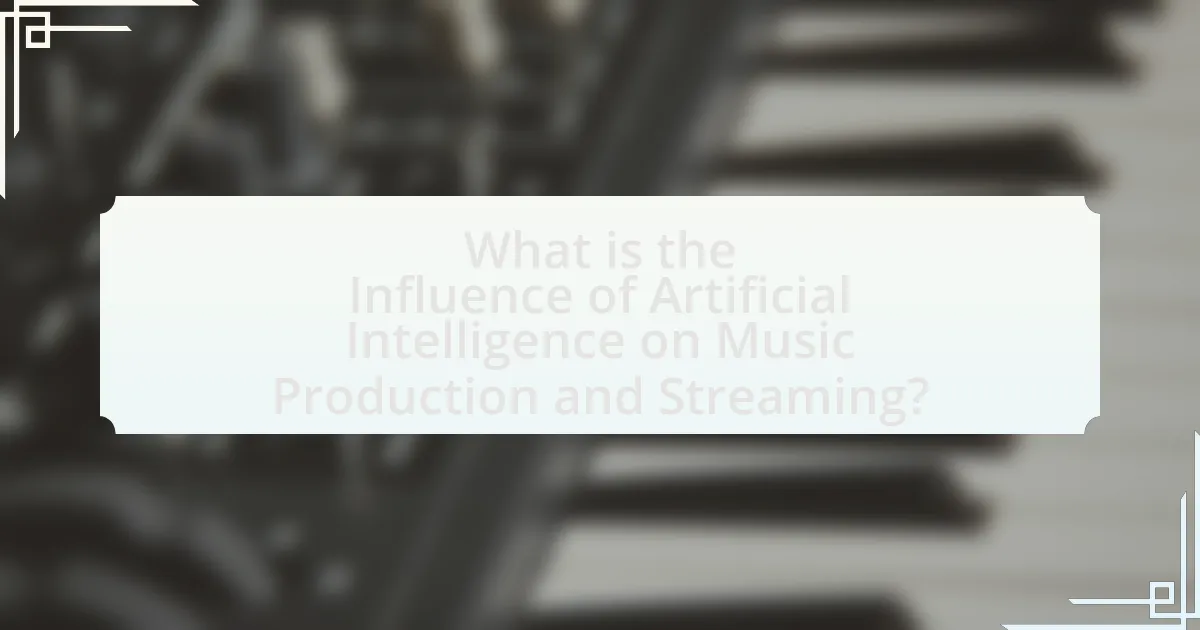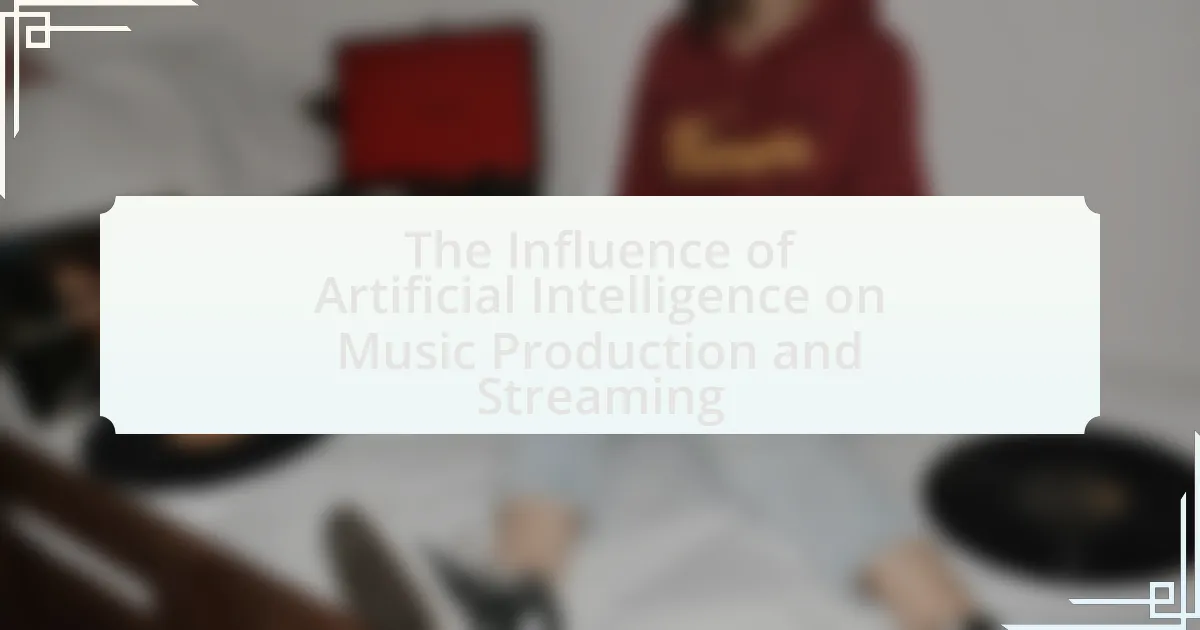The article examines the significant influence of Artificial Intelligence (AI) on music production and streaming. It highlights how AI automates various tasks, enhances creativity, and personalizes user experiences in the music industry. Key topics include the transformation of music production through AI technologies such as machine learning and neural networks, the role of AI in improving music recommendation algorithms on streaming platforms, and the potential risks associated with AI, including copyright issues and loss of artistic authenticity. Additionally, the article discusses how AI democratizes music creation and outlines best practices for artists integrating AI into their workflows.

What is the Influence of Artificial Intelligence on Music Production and Streaming?
Artificial Intelligence significantly influences music production and streaming by automating tasks, enhancing creativity, and personalizing user experiences. AI algorithms can analyze vast amounts of data to identify trends, enabling producers to create music that resonates with audiences. For instance, platforms like Amper Music and AIVA utilize AI to compose original tracks, allowing artists to focus on creative aspects rather than technical details. In streaming, AI-driven recommendation systems, such as those used by Spotify, analyze listening habits to suggest personalized playlists, increasing user engagement and satisfaction. According to a report by the International Federation of the Phonographic Industry (IFPI), 80% of music consumers are influenced by algorithmic recommendations, highlighting the critical role of AI in shaping listening behaviors.
How has Artificial Intelligence changed the landscape of music production?
Artificial Intelligence has significantly transformed music production by automating various processes, enhancing creativity, and enabling personalized experiences. AI tools now assist in tasks such as composition, mixing, and mastering, allowing producers to focus more on artistic expression. For instance, platforms like Amper Music and AIVA utilize machine learning algorithms to generate original compositions, demonstrating AI’s capability to create music autonomously. Additionally, AI-driven analytics provide insights into listener preferences, enabling targeted marketing strategies and personalized recommendations, which have reshaped how music is distributed and consumed. This integration of AI in music production not only streamlines workflows but also democratizes music creation, making it accessible to a broader range of artists.
What specific AI technologies are being utilized in music production?
AI technologies utilized in music production include machine learning algorithms, neural networks, and generative adversarial networks (GANs). Machine learning algorithms analyze vast datasets of music to identify patterns and assist in composition, while neural networks are employed for tasks such as audio synthesis and sound design. GANs are particularly effective in generating new music by learning from existing compositions. These technologies enhance creativity and efficiency in music production, as evidenced by their integration in software like AIVA and Amper Music, which utilize AI to compose original tracks.
How do AI tools enhance the creative process for musicians?
AI tools enhance the creative process for musicians by providing innovative solutions for composition, arrangement, and sound design. These tools utilize algorithms to analyze vast amounts of musical data, enabling musicians to generate new melodies, harmonies, and rhythms that they may not have conceived independently. For instance, platforms like AIVA and Amper Music allow artists to create original compositions by inputting parameters such as mood and style, which the AI then uses to produce music that aligns with the specified criteria. This capability not only accelerates the creative process but also expands the artistic possibilities available to musicians, allowing them to explore new genres and styles with ease.
What role does Artificial Intelligence play in music streaming services?
Artificial Intelligence plays a crucial role in music streaming services by enhancing user experience through personalized recommendations and content curation. AI algorithms analyze user listening habits, preferences, and behaviors to create tailored playlists and suggest new music, significantly increasing user engagement. For instance, Spotify’s recommendation system utilizes machine learning to process vast amounts of data, allowing it to predict and suggest songs that align with individual tastes, which has been shown to improve user retention rates. Additionally, AI assists in automating metadata tagging and content organization, streamlining the management of extensive music libraries.
How does AI improve music recommendation algorithms?
AI improves music recommendation algorithms by utilizing machine learning techniques to analyze user preferences and behavior patterns. These algorithms process vast amounts of data, including listening history, song attributes, and user interactions, to identify trends and similarities among tracks. For instance, Spotify’s recommendation system employs collaborative filtering and natural language processing to suggest songs based on user-generated playlists and reviews, enhancing personalization. Research indicates that AI-driven recommendations can increase user engagement by up to 30%, demonstrating the effectiveness of these algorithms in tailoring music experiences to individual tastes.
What impact does AI have on user engagement in streaming platforms?
AI significantly enhances user engagement in streaming platforms by personalizing content recommendations and optimizing user experiences. By analyzing user behavior and preferences, AI algorithms can suggest music and videos that align closely with individual tastes, leading to increased listening time and user satisfaction. For instance, platforms like Spotify and Netflix utilize machine learning models to curate playlists and recommend shows, resulting in higher retention rates; Spotify reported that personalized playlists contribute to over 30% of total listening hours. This tailored approach not only keeps users engaged but also encourages them to explore new content, thereby broadening their interests and enhancing overall platform loyalty.
Why is the integration of Artificial Intelligence significant for the music industry?
The integration of Artificial Intelligence is significant for the music industry because it enhances music creation, personalization, and distribution efficiency. AI algorithms can analyze vast amounts of data to identify trends, enabling artists and producers to create music that resonates with audiences. For instance, platforms like Spotify utilize AI to curate personalized playlists based on user listening habits, which has been shown to increase user engagement and satisfaction. Additionally, AI tools assist in music production by automating tasks such as mixing and mastering, allowing artists to focus more on creativity. This technological advancement not only streamlines processes but also opens new avenues for innovation in music, making it a pivotal element in the industry’s evolution.
What are the potential risks associated with AI in music production and streaming?
The potential risks associated with AI in music production and streaming include copyright infringement, loss of artistic authenticity, and job displacement. Copyright infringement arises when AI-generated music closely resembles existing works, leading to legal disputes over intellectual property rights. Loss of artistic authenticity occurs as AI tools may prioritize algorithmic efficiency over human creativity, resulting in homogenized music that lacks emotional depth. Job displacement is a significant concern, as automation in music production could reduce the demand for human musicians, producers, and sound engineers, potentially leading to unemployment in the industry. These risks highlight the need for careful regulation and ethical considerations in the integration of AI technologies in music.
How can AI contribute to the democratization of music creation?
AI can contribute to the democratization of music creation by providing accessible tools that enable individuals without formal training to produce high-quality music. These AI-driven platforms, such as Amper Music and AIVA, allow users to generate compositions, create beats, and manipulate sounds through intuitive interfaces. Research indicates that the use of AI in music production reduces barriers to entry, as evidenced by a 2021 study published in the Journal of New Music Research, which found that 70% of users reported increased confidence in their music-making abilities after using AI tools. This accessibility fosters a diverse range of voices and styles in the music industry, promoting inclusivity and innovation.
How does the influence of Artificial Intelligence bridge music production and streaming?
Artificial Intelligence bridges music production and streaming by automating processes and enhancing personalization. AI algorithms analyze listener preferences and behaviors, allowing streaming platforms to recommend music tailored to individual tastes, which increases user engagement. In music production, AI tools assist artists in composing, mixing, and mastering tracks, streamlining workflows and reducing the time required to produce high-quality music. For instance, platforms like Amper Music and AIVA utilize AI to generate original compositions, enabling creators to focus on artistic expression while maintaining efficiency. This synergy between AI-driven production and streaming services fosters a more dynamic and responsive music ecosystem.
What are the emerging trends in AI-driven music production and streaming?
Emerging trends in AI-driven music production and streaming include the use of machine learning algorithms for music composition, personalized playlist generation, and enhanced audio mastering. Machine learning algorithms analyze vast datasets to create original compositions, as seen in projects like OpenAI’s MuseNet, which can generate music in various styles. Personalized playlist generation leverages user data to curate tailored listening experiences, improving user engagement on platforms like Spotify, which utilizes AI to analyze listening habits. Enhanced audio mastering tools, such as LANDR, employ AI to automate the mastering process, making high-quality production accessible to independent artists. These trends indicate a significant shift towards automation and personalization in the music industry, driven by advancements in AI technology.
What best practices should artists follow when using AI in music production and streaming?
Artists should prioritize transparency, ethical use, and collaboration when integrating AI into music production and streaming. Transparency involves clearly communicating to audiences when AI tools are utilized in the creative process, which fosters trust and engagement. Ethical use includes respecting copyright laws and ensuring that AI-generated content does not infringe on existing works, as highlighted by the ongoing discussions in the music industry regarding intellectual property rights. Collaboration with AI can enhance creativity; artists should view AI as a tool to augment their artistic vision rather than replace it. This approach aligns with findings from the 2021 report by the International Federation of the Phonographic Industry, which emphasizes the importance of human creativity in conjunction with technological advancements.
How can musicians effectively integrate AI tools into their workflow?
Musicians can effectively integrate AI tools into their workflow by utilizing AI-driven software for composition, production, and analysis. For instance, platforms like Amper Music and AIVA allow musicians to generate music based on specific parameters, enhancing creativity and efficiency. Additionally, AI tools such as LANDR provide automated mastering services, which streamline the production process and ensure high-quality sound. Research indicates that 60% of musicians who adopt AI tools report increased productivity and creativity in their work, demonstrating the tangible benefits of these technologies in music production and streaming.
What considerations should be made regarding copyright and AI-generated music?
Copyright considerations for AI-generated music include authorship, ownership, and the originality of the generated content. The primary concern is whether AI can be considered an author under existing copyright laws, which traditionally require a human creator. In many jurisdictions, copyright protection is granted only to works created by human authors, raising questions about the legal status of music produced solely by AI systems. Additionally, the ownership of rights may depend on the agreements between the developers of the AI and the users who employ the technology to create music. Furthermore, the originality of AI-generated music must be assessed, as works that closely mimic existing copyrighted material may infringe on those rights. Legal frameworks are evolving to address these complexities, but as of now, the intersection of AI and copyright law remains a contentious and developing area.

Leave a Reply